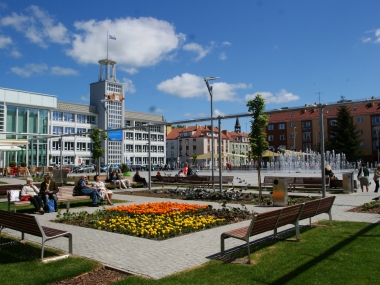 Increasing awareness as to the role that can be played by public procurement for all of the participants of the process has a feedback effect on advantageous changes in the legal environment to facilitate reaching the objectives of the “Making Spend Matter” Project.
Increasing awareness as to the role that can be played by public procurement for all of the participants of the process has a feedback effect on advantageous changes in the legal environment to facilitate reaching the objectives of the “Making Spend Matter” Project.
Procurement procedures are not infrequent where merely one bid is submitted or no bids are submitted at all. As demonstrated by the experience on the part of the members of the Local URBACT Group of the City of Koszalin, the low level of the participation of our entrepreneurs in tenders is related not only to those understandable situations where goods, services or works are being contracted that are not offered by local companies but also to those where it is clear that indeed there are companies in Koszalin that could become contractors.
Therefore, the first challenge we need to respond to is lack of awareness. The entrepreneurs from Koszalin are to a large extend unaware of how big a portion of the economic market is constituted by public procurement and that participation in these may become an opportunity for a new impulse for the development of their companies. They do not know what goods, services or works are contracted over the year by the City of Koszalin and other anchor public institutions from Koszalin. They are not aware of where to look for such information and how to participate in public procurement, especially when this concerns micro- and small enterprises with limited resources and organizational potential that dominate the local economy.
Likewise, public institutions do not possess sufficient knowledge as to what goods and services the local companies may supply, in particular in relation to public procurement below the national threshold of the net amount of 30,000 euro, which is not subject to the Public Procurement Law, where public entities may be more flexible and may use internal procedures.
This challenge may be responded to on the local level by cooperating as public procurers in the Local URBACT Group with the representatives of those organizations that associate and support entrepreneurs, while increasing the awareness on the part of SMEs and public entities through, among others, informing and promoting participation in public procurement, creation of educating and informational websites, catalogues of local enterprises and procurers’ profiles.
Traditionally, the Polish law related to public procurement constitutes yet another key challenge. It is characterized by a significantly greater rigorism and a high degree of bureaucracy as compared to the EU law. This is the result of experience from the past and the state’s legal culture related to an insufficient level of public trust, the result being a legislative and administrative system that is focused more on the administering process itself rather than its objective. The effect of this is meticulous and frequently changing regulations and extended control procedures as well as an inequality between the parties that are participating in the public procurement process.
This is a challenge that may be responded only in part on the local level. For example, we may try to increase the entrepreneurs’ competences by organizing trainings to increase their knowledge and to strengthen their potential. However, the public institutions in Koszalin may simplify the procedures and facilitate access on the part of SMEs to procurement processes based on the Public Procurement Law only to the extent permitted by the national law.
Nevertheless, it is also the national government that is beginning to perceive the potential dwelling in public procurement, which may be something more than merely a set of procedures aimed at a selection of the contractors of public services; the government would like tenders no longer to be a goal in themselves but to become a tool that directs this huge stream of public spend in a manner that stimulates the growth of innovation and the implementation of other strategic economic and social objectives; where an increased participation of SMEs, which react much more flexibly to changes and that dominate the economy, may be of a great help.
For this very reason, a totally new draft of the Public Procurement Law has been developed by the newly created Ministry of Enterprise, which is to come in force on 1 January 2020. This introduces to the Polish law a comprehensive package of solutions that promotes access on the part of SMEs to the public procurement market, which goes further than the mandatory facilitations for SMEs implemented with the EU Directives from the year 2014 (including a ban related to the formulation of excessive economic conditions for the participation in the procedure, recommendations for the division of contracts into smaller lots, electronization of the process).
The package includes among others substantial simplifications of the basic national procedure for procedures above the 30,000 euro amount, and which do not exceed the thresholds defined by the European Union, a catalogue of prohibited abusive clauses in contracts to level out the imbalance between the parties, the need of the price indexation for contracts that exceed a period of one year, compulsory advance payments and interim payments, or conciliatory procedure to settle disputes between the parties to the process.
The progressing evolution of the awareness of public procurers and SMEs in relation to the role of public procurement and the following advantageous changes in the legal environment undoubtedly constitute a great facilitation to reaching the objectives of the “Making Spend Matter” Project by the City of Koszalin.

